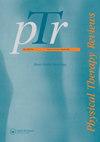持续脑震荡后症状个体的应激反应功能障碍:范围审查
IF 0.8
Q4 REHABILITATION
引用次数: 1
摘要
背景初步证据表明,持续性脑震荡后症状(PPCS)患者存在由自主神经系统(ANS)和下丘脑-垂体-肾上腺轴(hpa -轴)组成的功能失调应激反应。本综述旨在通过使用非侵入性和临床工具单独绘制有关(1)ANS和(2)hpa轴可量化变化的文献,并突出任何(3)知识空白,探索PPCS个体应激反应功能障碍的证据程度。方法于2021年6月1日和2021年10月4日检索9个电子数据库和灰色文献。如果他们的人群被归类为PPCS,并且他们的研究使用非侵入性和临床工具陈述了至少一个可量化的ANS或hpa轴标记物,则纳入研究。筛选相关研究,提取数据。结果共纳入37篇文献。与hpa -轴(n = 2)、ANS和hpa -轴(n = 1)相比,大多数研究评估了ANS的可量化标记物(n = 34)。ANS最常见的可量化指标包括心率(n = 20)、血压(n = 16)和心率变异性(n = 10)。皮质醇是唯一可量化的hpa轴标志物(n = 2)。结论本综述中的大多数证据支持可量化的PPCS患者的ANS功能障碍。在PPCS患者中,需要进一步研究hpa -轴的可量化功能障碍,以及随后的ANS和hpa -轴的一致。本文章由计算机程序翻译,如有差异,请以英文原文为准。
Dysfunction of the stress response in individuals with persistent post-concussion symptoms: a scoping review
Abstract Background Preliminary evidence suggests that individuals with persistent post-concussion symptoms (PPCS) have a dysfunctional stress response, consisting of the autonomic nervous system (ANS) and hypothalamic pituitary adrenal-axis (HPA-axis). Objectives This review aims to explore the extent of evidence for dysfunction of the stress response in individuals with PPCS by individually mapping the literature surrounding quantifiable changes of the (1) ANS and (2) HPA-axis using non-invasive and clinical tools, and highlighting any (3) knowledge gaps. Methods Nine electronic databases and grey literature were searched on the 1st of June 2021 and 4th of October 2021. Studies were included if their population was classified with PPCS, and their study stated at least one quantifiable marker of the ANS or HPA-axis using non-invasive and clinical tools. Relevant studies were screened, and data extracted. Results A total of 37 articles were included in this scoping review. The majority of studies assessed quantifiable markers of the ANS (n = 34), in comparison to the HPA-axis (n = 2), and ANS and HPA-axis (n = 1). The most common quantifiable markers of the ANS included heart rate (n = 20), blood pressure (n = 16), and heart rate variability (n = 10). Cortisol was the only included quantifiable marker of the HPA-axis (n = 2). Conclusions Most of the evidence in this review supports quantifiable dysfunction of the ANS in those with PPCS. Further research is required investigating quantifiable dysfunction of the HPA-axis, and subsequently ANS and HPA-axis in unison, in those with PPCS.
求助全文
通过发布文献求助,成功后即可免费获取论文全文。
去求助
来源期刊

Physical Therapy Reviews
REHABILITATION-
CiteScore
1.30
自引率
0.00%
发文量
26
期刊介绍:
Physical Therapy Reviews is an international journal which aims to publish contemporary reviews, discussion papers and editorials within physical therapy, and in those basic and clinical sciences which are the basis of physical therapy. The journal is aimed at all those involved in research, teaching and practice within the area of physical therapy. Reviews (both descriptive and systematic) are invited in the following areas, which reflect the breadth and diversity of practice within physical therapy: •neurological rehabilitation •movement and exercise •orthopaedics and rheumatology •manual therapy and massage •sports medicine •measurement •chest physiotherapy •electrotherapeutics •obstetrics and gynaecology •complementary therapies •professional issues •musculoskeletal rehabilitation
 求助内容:
求助内容: 应助结果提醒方式:
应助结果提醒方式:


